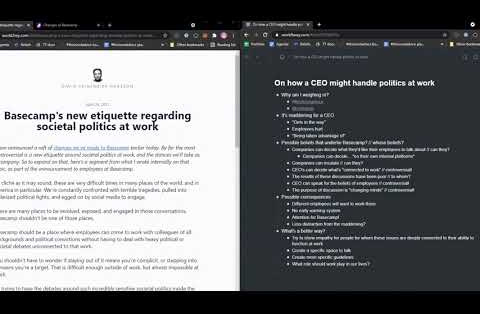Attracting Talent in Europe
Today: Europe wants to attract more tech talent from abroad. That’s more complicated than it sounds.

The Agenda 👇
Nomadism is easy for individuals, harder for households
That’s because every nomad is confronted with many frictions
And the complexity grows exponentially if several people are involved
So, no: streamlining visa procedures is not enough
Europe still has a long way to go if it wants to attract foreign talent
Thumbs up/down for last week
Recently my wife Laetitia and I dedicated an episode of our French-speaking podcast Nouveau Départ to why it’s difficult to be a nomad if you’re not on your own [private link 🎁] 🎧
Although not everyone has the mindset of a nomad, once you’ve decided to become one it’s relatively easy to deal with the many obstacles and the administrative hassle.
On the other hand, if nomadism is practiced at the scale of an entire household (two spouses, a child or two, and perhaps others as well), everything becomes difficult.
What feels like a stimulating challenge for a single individual, such as finding a job, becomes a nightmare when the two spouses each need to find a job in a new city.
Usually the decision to move is taken once one of the two has found a job, but then it can take a long time before the other finds a professional situation that matches their expectations.
In our conversation with Laetitia, I echoed the many times I had explained to someone (usually an elected official) that, no, a visa doesn’t solve everything.
In the latest episode of Building Bridges, Deborah Copaken, a former writer on Emily in Paris, told Laetitia that many young Americans want to move to Paris after having watched the show.
And sure, you need a visa. But actually you need much more than that: first you need to find an apartment (an issue that Emily, the show’s main character, doesn’t have to deal with).
Then you need to blend with your colleagues, most of whom will not switch to speaking English all the time just because you’re here. So you need to speak the language.
Imagine how much more difficult it becomes if, unlike Emily, you’re not on your own and your spouse has to go through the same issues as well. And then you need a school for your kids.
Again, too often, the conversations about making Europe more attractive for foreign tech talent revolve around simplifying the visa procedure, ignoring all these other problems in the process.
Don’t get me wrong: there are a lot of problems to be solved on the visa front. We at The Family have many times had to help people from India or the US deal with a visa in France.
But elected officials in Paris, Berlin, Barcelona or Amsterdam miss the point when they think that a simplified visa procedure will trigger a flock of foreign talent moving into their city.
I was reminded of this by an American friend who, after having listened to the podcast, explained that they were about to move back to the US (with their French spouse) after years in Paris.
Part of my friend’s problem is simply their US citizenship. As explained in Is Being American Worth It Anymore?, being American comes with complexity and frictions on the taxation front.
Even with another (European) nationality, US citizenship makes it difficult for potential employers to hire you, or banks to open an account for you, etc. in Europe.
The fact that remote work is becoming more of a norm doesn’t make it easier, as discussed in Challenges of a Remote Workforce—in many cases, quite the contrary!
Another issue encountered by this American friend: the much lower level of vibrancy in the Paris entrepreneurial ecosystem as compared with what’s currently happening in the US.
If you’re an American living in Europe, you’re still connected to the homeland through relatives, friends, news—and you can feel the difference in terms of vibrancy and energy.
Then there’s the problem nobody mentions: housing. In Emily in Paris, she’s all settled thanks to her employer, who already arranged a flat. In reality, it doesn’t work like that.
On the Paris housing market, you’re competing with dozens of other applicants, and so landlords won’t even consider you if there’s anything out of the ordinary about you.
Do you work in the tech sector? Sounds unstable. Are you an entrepreneur? That’s a huge risk! And yes, do you have a weird name or dark skin? Sorry, we picked someone else 😖
And then there’s the worst part: you come from abroad! That means the new landlord can’t (won’t) get any past references, and it’s difficult to assess your trustworthiness.
Most French people know all about the housing issue, so when they’re young and single, they forge fake payslips to fool landlords, or they sublet from a roommate that’s already settled.
But a foreigner won’t do that, because 1/ they don’t suspect it’s common practice, 2/ breaking the law could endanger their visa, and 3/ it doesn’t work if it’s for a family.
And then there’s one last thing: salaries. There are many ecosystems in Europe where founders have fallen victim to the romantic vision of ‘building startups = living in poverty’.
It’s a mix of altruism (“You don’t get paid for changing the world”), lack of capital, tax burden (in France, a worker costs twice as much as their net salary), and path dependency.
But that’s one thing we see in truly global industries such as financial services or football: attracting foreign talent requires leveling up salaries from one country to another.
All these small problems pile up to explain why Europe, especially European cities that are not London, still has problems attracting talent.
Roxanne Varza, the head of Paris-based startup campus Station F, echoes this sentiment in a recent article in Sifted, Is bureaucracy chasing talent away from Europe?
A lot of founders tell us the hard part is actually once they get to Europe. It’s doing things like opening a bank account, getting a mobile phone subscription and renting a flat. The simpler we make all these things the more happy founders we’ll have.
What do you think? Have you spotted good practices when it comes to attracting foreign talent in lagging entrepreneurial ecosystems?
😀 I have been writing about the state of Delaware and building startups across borders recently, which prompted Joris Delanoue, cofounder of our portfolio company Fairmint, to send me this essay he wrote in December (part of a series): Running a business like a boss in the US — Chapter I
🙂 Many people are predicting the end of nation states, yet the pandemic, arguably one of the most consequential events in our lifetime, has rather reinforced them. Have a look at Francis Fukuyama’s Will We Ever Get Beyond The Nation-State? in Noema.
😏 Back in 2011 Tim O’Reilly predicted that one day a company (he suggested Amazon) would provide small businesses with a platform to handle sales tax. Well, it turns out to not be Amazon but a Boston-based company called TaxJar which has just been acquired by Stripe!
😐 About one year ago I was talking about Darwinian economics as the pandemic was heating up competition and reshuffling the cards. Well here’s an example in the airline industry: How Qatar Airways, With Its Covid-19 Playbook, Dethroned Emirates as Biggest Long-Haul Airline.
😒 My friend Roy Bahat, the head of VC firm Bloomberg Beta, comments on recent events at Basecamp (before it was announced that one third of their employees had quit):


😖 The situation is worsening quickly in India, leading to frightening coverage such as Arundathi Roy’s We are witnessing a crime against humanity and Sinduja Rangarajan’s I Thought My Family in India Was Safe. Now, I'm Terrified. Also, this thread:


If you’ve been forwarded this paid edition of European Straits, you should subscribe so as not to miss the next ones.
From Munich, Germany 🇩🇪
Nicolas






I would like to bring your attention to the enormous success of Latvian Startup Law - https://startuplatvia.eu
It takes you just 1 month to get a residence permit as founder (spouse & children included), no need to pay yourself a minimum salary (taxes), 2-3 weeks for working visas for your employers.
Cost structure in Riga something like 50% of Berlin prices with better quality. Lot’s of cheap & good offices and flats.
Lowest crime rates in the EU, safety, etc. And the highest rate of women in the EU at the top management & entrepreneur position =)